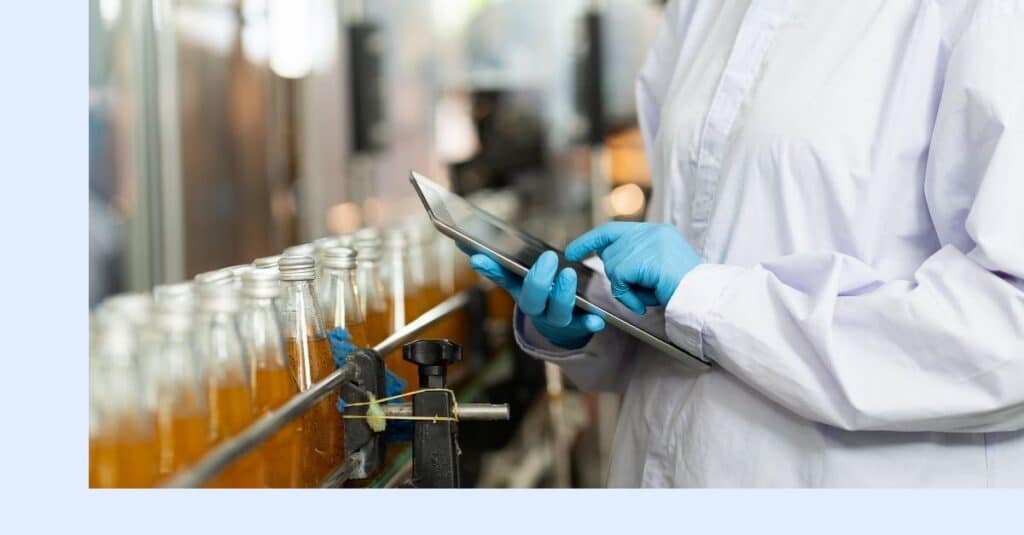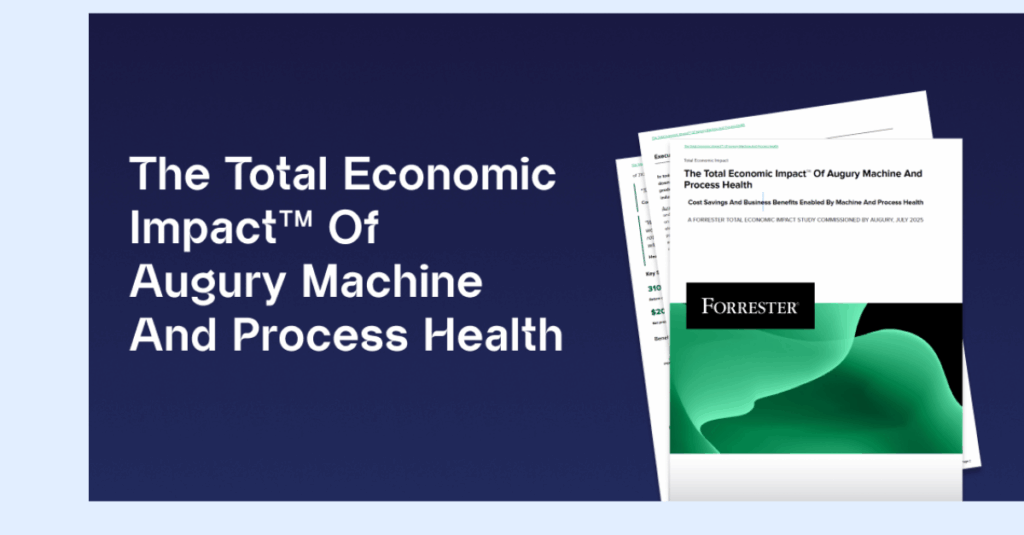
Chris Dobbrow is Augury’s VP of Business Development. In this article, he explains why, despite his diverse background, he wouldn’t want to work in any other sector than manufacturing. “Yes, there’s a lot of uncertainty. But I am optimistic about the industry’s future and AI’s potential to address the skills gap while enhancing productivity and sustainability. It’s about continually improving on what you excel at – as a person, an organization, and an industry.” But yes, there’s still work to be done…
Making Products Better
Back in the 1990s, BASF ran a great campaign with the slogan: “We don’t make a lot of the products you buy, we make a lot of the products you buy better.” For me, it really sums up what we’re doing at Augury.

On a basic level, all these machines help manufacturers produce their goods. Whether you’re making cheese, bread, or fuel for our cars, increasingly complex machines facilitate this process. Our role at Augury is to ensure machines run more consistently and efficiently while extending their lifespan. Why retire a machine at 20 years when it can last 30? It’s all about making manufacturing more effective and sustainable, which benefits society as a whole.
Yes, we’re in business to make money. However, we also have a moral compass that allows us to approach manufacturers honestly about how we can assist them in becoming better corporate citizens. And yes, some manufacturers need more help than others. Believe me, there are times when we walk through these plants and observe what’s happening that I question, “Why am I eating this again?”
We believe we can help everyone enhance their operations through our Machine Health and Process Health offerings. In turn, this improves conditions for their customers and employees, ensures safety for their workers, and contributes positively to the environment.
“My role is to help manufacturers understand how our solutions can assist—not only in achieving goals on the factory floor but also in reaching corporate objectives related to ESG, sustainability, reducing energy consumption, and ensuring worker safety.”
A Passion For How Things Are Made
I share the same natural curiosity that many in our industry possess about how things are made. It’s fascinating to witness the process of recycling steel in a 1,000-degree-plus furnace, melting it into a fine powder and then stamping new car parts from it. I’m equally fascinated when I see trucks arrive with piles of variously sized potatoes, and then watch these transform into chips or curly fries. Whatever the case, I always love walking through a plant and observing the entire process.
My role is to help manufacturers understand how our solutions can assist—not only in achieving goals on the factory floor but also in reaching corporate objectives related to ESG, sustainability, reducing energy consumption, and ensuring worker safety—all the intangible factors that may not typically appear in a corporate financial report, though they are increasingly doing so, which is a positive development.
Building On Trust
I actually began my career in media at a company called Ziff Davis, where I spent 20 years. It was founded and owned by Bill Ziff, who was a larger-than-life character known for understanding the direction of media and the role technology would play in society and business. What was remarkable about Ziff Davis was our belief that content is king. If advertisers trusted the content, that’s where they wanted to be because that’s where the readers would go. That was our play, and it worked very well for a long time. It was a fantastic experience. But yes, times change…
“I still believe in the power of trustworthy content, dedicated customer support, and an organization united around a shared cause.”
But there, I also saw how things were made from the other side of the table. Computer companies like Dell and Gateway were situated in these regions of deep Texas and up in South Dakota, near slaughterhouses, where they produced computers with black-and-white cow prints that became successful businesses. You could observe these remarkable journeys, and you got to influence them.
Later, I transitioned to the software side that developed application lifecycle management and software configuration management, which enabled software development globally with hundreds or thousands of developers contributing to the same project. It was inspiring to witness what a well-organized team could achieve. What was also interesting was that they had no sales team; their motto was ‘Sales without the force.’ They focused entirely on providing exceptional customer support. They understood that after the financial crisis, they needed to adapt, as their previous approach was no longer adequate. Indeed, things continue to evolve…
However, I still believe in the power of trustworthy content, dedicated customer support, and an organization united around a shared cause.
Immediate Value You Can See
This all eventually led to manufacturing. The common thread is that I’ve always had a real curiosity about how things get made—how content, software, and physical products are made. It’s a lifelong learning journey. And that’s why I’m still working: because it’s fun.
In the spirit of lifelong learning, I met with a recruiter from Augury. I wasn’t particularly interested in changing jobs, but I am always curious about other players in the market, so I agreed. A month later after meeting the rest of the executive team, I was hired.
What fascinated me was how Augury did what they were doing as a startup. The year before, they had just pivoted from working with commercial HVAC companies to manufacturing, and I was deep in manufacturing, so there was a nice connection. I really liked that it was a point-based solution that provided immediate value for customers, and they could see that value quickly once installed.
“Seeing is believing,” as they say.
“They were good at what they were doing, and we could bring what we were good at to the table—win-win.”
Progress Booked In Previous Uncertain Times
But then there was that bump in the road. I joined Augury in September 2019 to do partnerships. Two months later, I had sales and partnerships. Three months after that, COVID hit.
I had my ‘Oh shit’ moment, wondering what I had signed up for. However, it turned out to be great for Augury because companies recognized the need for a remote method to monitor their equipment without requiring a large physical presence. It truly opened many eyes for us in the industry.
At that time, we knew it would be difficult to acquire new customers, as they were preoccupied with hunkering down. So, we concentrated on our existing customers, and we managed to grow both segments. We attracted new customers while also expanding our existing customer base. We experienced significant growth during that year and a half, which prepared us to scale further.
In the meantime, I could concentrate on forging strategic partnerships with companies such as Baker Hughes in the energy technology sector and Schneider Electric on the energy distribution front—these partnerships would enable us to grow and venture into other industry segments that would be nearly impossible to access independently. They were good at what they were doing, and we could bring what we were good at to the table—win-win.
“We believe Augury can help usher manufacturing into a new golden age with technology—not as a substitute for people but as a means to empower them.”
And Now We Are Here
We are in new, uncertain times. Manufacturing was in crisis during COVID, and it is in a crisis now. Geopolitical issues and tariffs create uncertainty in the supply chain, and manufacturers are pushing to go onshore or nearshore. This transition doesn’t happen overnight.
So, how can you address this uncertainty in the marketplace? I believe the primary issue is the shortage of skilled workers—over a million in manufacturing. A recent survey reported in the Financial Times uncovered the reason behind this. More than 80% of those surveyed indicated that America is better off with manufacturing in the US. However, when asked if they would be better off as individuals with a job in manufacturing, only about 25% responded positively. This demonstrates that manufacturing is not viewed as a desirable job (an opinion I strongly disagree with, by the way).
We believe Augury can help usher manufacturing into a new golden age with technology—not as a substitute for people but as a means to empower them. Technology can enhance job safety and productivity, enable individuals to breathe, cultivate their skill sets, and concentrate on high-value tasks that contribute more to their company.
“I want the world to be a safe and healthy place. And it’s within this industry that I believe I can make the most positive impact.”
The Path Forward: Building On Trust
I’m in this industry and will remain in it for as long as I work. I have a six-month-old granddaughter, and I want her to experience a world where she can thrive, grow up, and eventually have her own children. I want the world to be a safe and healthy place. And it’s within this industry that I believe I can make the most positive impact.
I see the main challenge as accelerating a sense of trust. Yes, we must prove ourselves before people will trust our solution to give them the actionable information they seek and see the results. But I wish there were more shortcuts. We need to find new ways to elevate our customers visually through media and other means—yes, I still believe that “Content is king.” But sometimes I also wish people just knew our customers: if they could sit down at a bar, have a beer with them, and discuss their journey, we could really accelerate industry transformation.
You Don’t Have To Understand AI To Trust The Results
At times we come across manufacturers attempting to develop some of the same solutions we provide. I always ask, ‘Are you making potato chips, or are you developing AI-based software? What’s your business? What are your strengths? We raised $300 million to figure this out, so will you budget the same?’
“At the end of the day, it’s simple: it’s about continual improvement.”
If they would focus on what they do well and find the right provider with a core competency that can help them solve their production challenges—whether it’s us or somebody else—and that makes their manufacturing safer, more productive, better for the environment, and better for everybody all around.
And yes, AI is the other trust-based elephant in the room—or rather, mosquito. There’s a lot of buzz and activity around AI, with aspects that could be incredible, and other aspects that scare me. The internet was similar; when it emerged, there were many great features and some drawbacks. The same will hold true for AI. However, in terms of what we do, focus on the practical results. Don’t worry about fully understanding AI. Instead, consider what it can do for you. You need to seek that connection rather than getting distracted by the bright, shiny objects everyone talks about.
At the end of the day, it’s simple: it’s about continual improvement. It’s about making that delicious bowl of chips even better. Surely, we can all get behind that?
Read more about Process Health.


